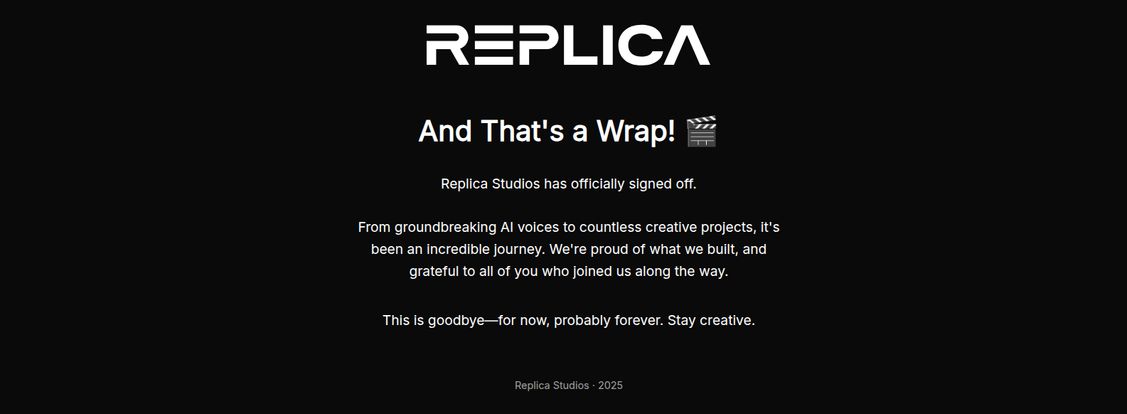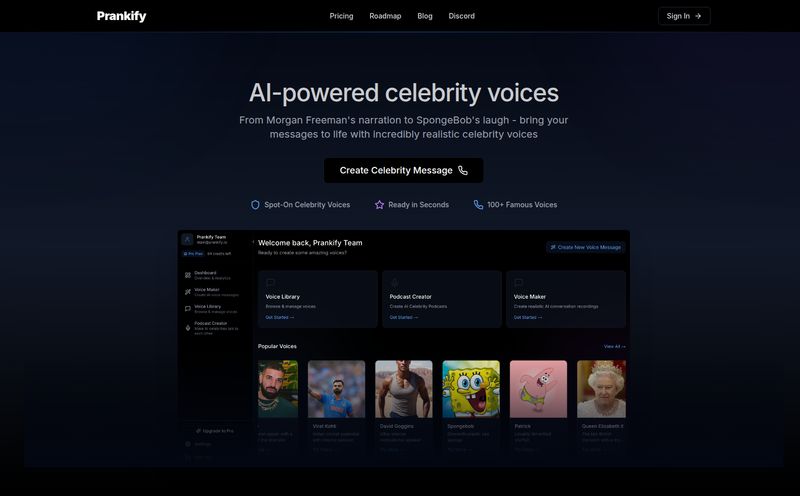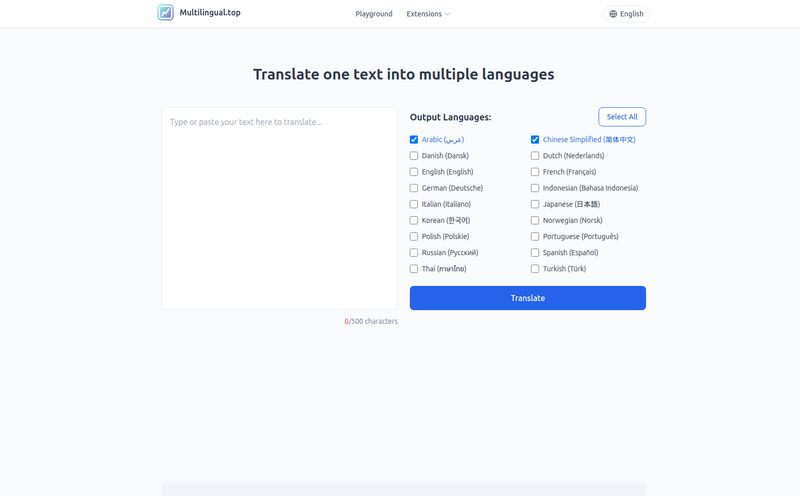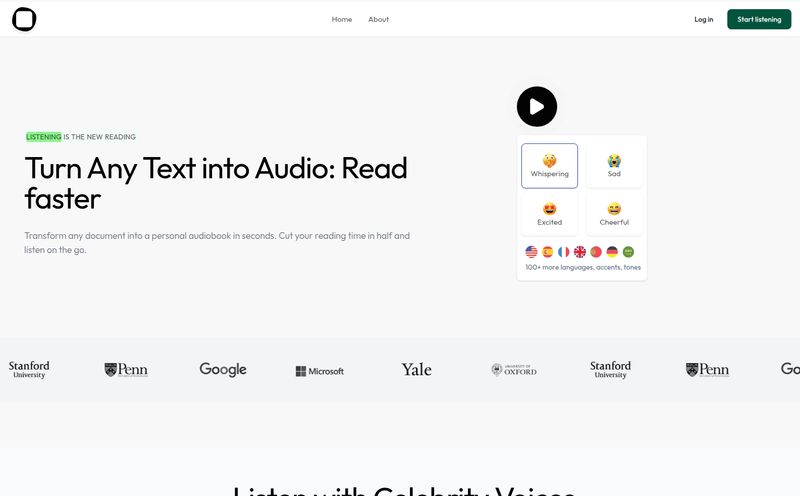Well, you hate to see it. I was doing my usual rounds, checking in on some of the tools I’ve followed over the years, and when I pulled up the Replica Studios website, I was greeted with a simple, stark message: “And That’s a Wrap! 🎬”
Yep, Replica Studios has officially signed off. Gone. Vanished into the digital ether, leaving behind a 404 error on its pricing page and a final, bittersweet goodbye note. For those of us in the SEO and creative tech space, especially those focused on traffic generation for games and digital media, this one stings a little. Replica wasn’t just another AI tool; it felt like one of the good guys, trying to navigate the choppy waters of AI voice generation with a conscience.
Their final message reads, “This is goodbye—for now, probably forever. Stay creative.” That “probably forever” hits hard. It’s the kind of honest uncertainty you see when a passion project closes its doors. So, let’s pour one out and take a look back at what Replica Studios was, what made it special, and what its closure might signal for the future of AI voices.

Visit Replica Studios
So, What Exactly Was Replica Studios?
For the uninitiated, Replica Studios was a platform offering AI-powered voice solutions, primarily for game developers, animators, and other creative types. Think of it as a digital voice actor on demand. You could feed it a script, and it would generate some surprisingly natural and expressive voice performances using its library of AI voices. It was a godsend for indie developers who couldn't afford to hire a full cast of voice actors for their sprawling RPGs, or for content creators needing quick, quality voice-overs for their videos.
They were carving out a really specific and much-needed niche. It wasn’t just about basic text-to-speech (TTS); they were pushing the envelope with technology that aimed to capture real human emotion and inflection.
The Features That Made Replica a Contender
Replica wasn't just a one-trick pony. The platform had a suite of tools that made it a powerful asset for creators. It was more than just a simple AI voice generator; it was a whole workshop for vocal performances.
More Than Just Text-to-Speech
The core of the platform was its TTS and Speech-to-Speech technology. The TTS was its bread and butter—type your dialogue, pick a voice, and get an audio file. But their Speech-to-Speech was the really cool part. It was essentially an AI voice changer on steroids. You could record a line in your own voice, capturing the pacing and emotion you wanted, and the AI would then “remap” it onto one of their professional AI voices. This gave directors and creators an incredible amount of control over the final performance, something standard TTS often lacks.
The Creative Power of the Voice Lab
This was where things got really interesting. The Voice Lab allowed users to design custom voices by blending attributes from different AI voices in their library. You could tweak pitch, pacing, and emotional tone to create a unique voice that perfectly fit your character. It was like being a casting director and a voice coach all at once, dialing in the exact performance you had in your head.
An Ethical Approach to AI Voice
Here’s the thing that I, personally, always admired about Replica. In an industry grappling with the ethics of AI, they took a firm stand. Their voice library was built ethically. They partnered with real, professional voice actors and compensated them fairly for their work. They had a revenue-sharing model, meaning actors continued to earn money as their AI voice counterparts were used in projects. This was—and still is—a huge deal. With all the recent debate around AI and artist rights, like the deals being struck by SAG-AFTRA, Replica's model felt like a responsible path forward. They weren't just scraping voices; they were building partnerships. That’s a legacy to be proud of.
A Price Point for Every Creator
Replica also understood its audience. They knew that a AAA game studio had a different budget than a solo developer working out of their bedroom. Their pricing was structured as a credit-based system, which had its pros and cons, but it offered a scalable solution for different project sizes. Of course, their pricing page is now a 404 error, but here's a rough breakdown of what they used to offer:
| Plan | Price (Monthly) | Credits & Target User |
|---|---|---|
| Starter | $8-$10 | 5,000 credits. Aimed at solo developers. |
| Indie | $24-$30 | 16,000 credits. For freelancers and small projects. |
| Pro | $80-$100 | 50,000 credits. For games with broad scope. |
| Pro+ & Enterprise | $500 - $1,500+ / project | 250k-500k+ credits. For dedicated studios and AAA titles. |
This tiered approach made their powerful tools accessible, which is something we're always happy to see.
So, What Happened? A Little Speculation
The big question is... why did they shut down? The company's final message doesn't give any specifics, but in the wild world of tech startups, we can make a few educated guesses.
The AI space is moving at a breakneck pace. It's incredibly competitive and expensive to stay on the cutting edge. Perhaps the cost of R&D and their ethical compensation model, while admirable, became unsustainable against competitors who might be... let's say, less scrupulous about where their data comes from. The market is also getting crowded. Tools like ElevenLabs, Lovo.ai, and others are major players now.
It could also be a classic case of an acquisition or an “acqui-hire,” where a larger company buys them out for their talent and technology, then shutters the public-facing product. Or maybe, just maybe, it was burnout. Building a company is a grind, and the team could have simply decided it was time to move on. That “probably forever” suggests the door isn't completely bolted, but it’s definitely closed for the foreseeable future.
The Legacy of Replica and What’s Next for AI Voice
Even though Replica Studios is gone, its impact shouldn't be forgotten. They proved that there's a market for high-quality, ethically produced AI voice. They set a standard that I hope other companies will follow. They showed that you can innovate without compromising your values.
For creators left in the lurch, the search for alternatives begins. When you're looking for a new AI voice tool, keep the lessons from Replica in mind. Ask questions about where their voices come from. Look for platforms that offer nuanced control over performance. And support the companies that are transparent about their practices. The future of creative AI depends on us making those conscious choices.
Your Questions About Replica Studios Answered
Is Replica Studios permanently closed?
Yes, it appears so. Their website displays a shutdown notice stating they have "officially signed off." While their message includes the phrase "goodbye—for now," the addition of "probably forever" suggests a permanent closure is very likely.
What was Replica Studios used for?
It was primarily used by game developers, animators, and content creators to generate high-quality AI voice-overs for their projects. Its tools allowed for everything from prototyping dialogue to producing final, in-game voice lines.
Why was Replica Studios considered ethical?
Replica Studios was known for its ethical approach to building its AI voice library. They partnered with professional voice actors, compensated them for the use of their voices, and had a revenue-sharing model. This stood in contrast to other models that might use voice data without clear consent or compensation.
What were the pricing plans for Replica Studios?
They offered a tiered, credit-based system. Plans ranged from a Starter plan at around $8/month for solo developers to Enterprise plans costing over $1,500 per project for large studios, making it accessible for various budgets.
Can I still access my old Replica Studios projects?
It is highly unlikely. With the platform and website being shut down, user accounts and saved projects are almost certainly inaccessible. Users would have needed to download any generated audio files before the closure.
What are some alternatives to Replica Studios?
The AI voice landscape is rich with alternatives. Some popular and powerful platforms include ElevenLabs, known for its realistic voice cloning and generation; Lovo.ai, which offers a large library of voices; and Murf.ai, which is popular for corporate and e-learning content. Always check their policies on commercial use and data ethics.
The Final Curtain Call
It’s always a bummer to write a post-mortem for a tool you respected. Replica Studios was a pioneer in a complicated field, and they tried to do things the right way. While their platform is no longer with us, the conversation they helped start about ethical AI, artist compensation, and creative control is more important than ever. So, hats off to the team at Replica. Thanks for the work you did. And as your final message said, we’ll all try to stay creative.
Reference and Sources
- Replica Studios (Archived):
https://www.replicastudios.com/ - SAG-AFTRA on AI: https://www.sagaftra.org/category/tags/ai



